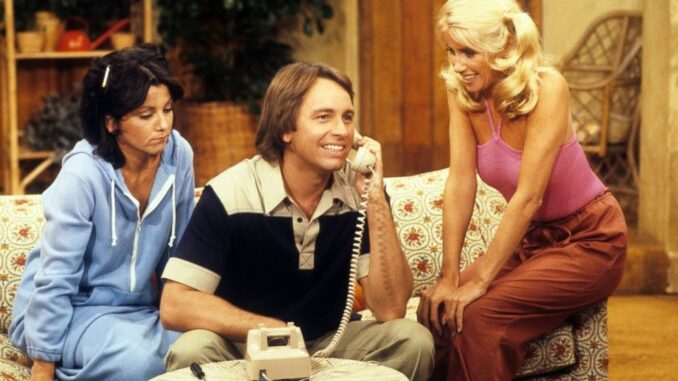
Name a classic show and, for all its success, you’re likely to find a mess of behind-the-scenes drama between the network and its star actor(s). The acclaimed hit series “Three’s Company” was no different, although the reason for why late star Suzanne Somers was ultimately fired from the production more than halfway through the show’s acclaimed run is certain to raise eyebrows. In fact, it remains every bit as insidious now as it was at the time.
TELEVISION COMEDY SHOWS
The Simple Request That Got Suzanne Somers Fired From Three’s Company
ABC
BY JEREMY MATHAIOCT. 16, 2023 9:00 PM EST
Name a classic show and, for all its success, you’re likely to find a mess of behind-the-scenes drama between the network and its star actor(s). The acclaimed hit series “Three’s Company” was no different, although the reason for why late star Suzanne Somers was ultimately fired from the production more than halfway through the show’s acclaimed run is certain to raise eyebrows. In fact, it remains every bit as insidious now as it was at the time.
Somers sadly passed away this week at the age of 76, leaving behind a wide-ranging legacy that largely stems from giving one of television’s most famous performances. As the “dumb blonde” Chrissy Snow, Somers made up the all-important third leg of the trio that also included co-stars John Ritter as Jack Tripper and Joyce DeWitt as Janet Wood. Together, the three formed the backbone for “Three’s Company” and its premise of three singles living together (and getting up to all sorts of wacky hijinks) in an apartment complex in California.
For four highly-rated seasons, fans flocked to their television screens in droves to luxuriate in the chemistry and humor fostered by all three actors … but by the time season 5 rolled around, cracks had already begun to show. Viewers noticed that Somers’ role had been reduced to a series of mere cameo appearances at the end of episodes, communicating to the rest of the cast solely by telephone. By season 6, when her original contract was up, she had been replaced entirely by Chrissy’s cousin Cindy (portrayed by actor Jenilee Harrison). The ever-outspoken Somers would make it abundantly clear that parting ways with the show had come as a result of sexism, after she dared to ask for the same pay as Ritter himself.
Know your worth
 Even in 1980, at the height of popularity for “Three’s Company,” Suzanne Somers knew she wasn’t getting what she deserved. Sure, her role as Chrissy Snow maybe wasn’t the most three-dimensional character ever played by a woman (although the star went on to proudly praise her character for her “moral code” and for being so “lovable”), but it was abundantly clear at the time that the show’s breakthrough success — for years, ABC pulled in upwards of 20 million viewers per episode — was largely due to Somers’ star power. So considering the three-pronged structure of the hit series, why shouldn’t she be the recipient of equal pay?
Even in 1980, at the height of popularity for “Three’s Company,” Suzanne Somers knew she wasn’t getting what she deserved. Sure, her role as Chrissy Snow maybe wasn’t the most three-dimensional character ever played by a woman (although the star went on to proudly praise her character for her “moral code” and for being so “lovable”), but it was abundantly clear at the time that the show’s breakthrough success — for years, ABC pulled in upwards of 20 million viewers per episode — was largely due to Somers’ star power. So considering the three-pronged structure of the hit series, why shouldn’t she be the recipient of equal pay?
In the wake of her death, fans and pundits alike are revisiting one of the most headline-grabbing conflicts from her time on “Three’s Company.” In a 2015 issue of The Hollywood Reporter, the outlet caught up with Somers and got her to recount the story of how she was boxed out of the show. At the time, she asked for a pay increase from $30,000 per episode to $150,000; in other words, a substantial hike that would put her on par with what John Ritter was making. In a strong-arm tactic eerily reminiscent of the ongoing SAG-AFTRA strike, however, the network countered with a paltry $5,000 raise. With tensions rising both on- and off-set, Somers’ presence as Chrissy was drastically reduced in season 5 before she was ultimately fired. Talking to Yahoo Life in 2021, she explained:
“I don’t know how much money they lost when they broke up that chemistry but I think it was in the billions. I hear it all the time to this day: ‘I never watched again when you weren’t there.'”
Although she wouldn’t win that particular battle, Somers’ example helped set a standard that her contemporaries are still fighting for today.
